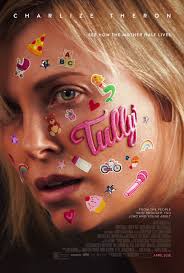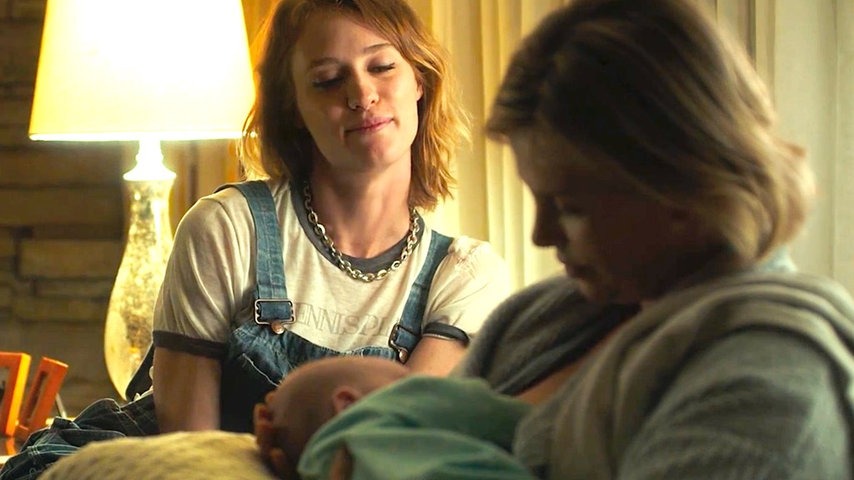Movie Review: “Tully” (R)
![]() Being the mother of a newborn child is clearly no easy task, and things can be even more taxing when said mom already has multiple children and a husband to look after. Just ask the exhausted mother at the center of “Tully,” the latest collaboration between director Jason Reitman and screenwriter Diablo Cody (“Juno” and “Young Adult”). Among other things, this film suggests that for a mom, keeping your head above water can be incredibly difficult, particularly when there’s little to no airspace to speak of.
Being the mother of a newborn child is clearly no easy task, and things can be even more taxing when said mom already has multiple children and a husband to look after. Just ask the exhausted mother at the center of “Tully,” the latest collaboration between director Jason Reitman and screenwriter Diablo Cody (“Juno” and “Young Adult”). Among other things, this film suggests that for a mom, keeping your head above water can be incredibly difficult, particularly when there’s little to no airspace to speak of.
 In “Tully,” Charlize Theron is Marlo, a mother of three — four if you count her video game-obsessed husband, Drew (Ron Livingston) — who opts to hire a free spirit of a nanny (Makenzie Davis) in an effort to regain the sanity that one sometimes tends to lose when providing for a newborn. Almost immediately, Tully proves to be a much welcome addition to the family, but this godsend of a nanny is so much more than a Mary Poppins-like figure to Marlo’s new addition. She also proves to be a source of strength and encouragement to Marlo herself and the perfect friend when this worn-out mom needs one most.
In “Tully,” Charlize Theron is Marlo, a mother of three — four if you count her video game-obsessed husband, Drew (Ron Livingston) — who opts to hire a free spirit of a nanny (Makenzie Davis) in an effort to regain the sanity that one sometimes tends to lose when providing for a newborn. Almost immediately, Tully proves to be a much welcome addition to the family, but this godsend of a nanny is so much more than a Mary Poppins-like figure to Marlo’s new addition. She also proves to be a source of strength and encouragement to Marlo herself and the perfect friend when this worn-out mom needs one most.
Theron (who also collaborated with Cody and Reitman on “Young Adult”) takes a break from the ass-kicking bravado of “Fury Road” and “Atomic Blonde” and settles into the overworked shoes of a character who a lot of moms will instantly relate too. She’s vulnerable, funny, sweet, lost, and on edge, all in equal measure, and this wonderful actress manages to navigate some fairly tricky terrain here.
Cute and spunky Davis hits all the right notes as a tell-it-like-it-is nanny who comes to Marlo’s rescue just when things appear to be at their absolute roughest. Whether she’s taking Marlo out for a crazy night on the town or aiding this sometimes slightly insecure mom by helping her reignite that dormant spark between her and her sometimes clueless husband, Tully is always there to remind Marlo that while it is important that she love her family unconditionally, it’s equally important that she love herself.
There’s an effortless ease in the way that Reitman and Cody work together. They’re symbiotic spirits and complement each other in all the right ways. That said, there are certainly cliched moments here and moments when Cody’s screenplay does get a little on the reckless side.
It should also be noted that “Tully” is fittingly progressive, particularly when it delves into Marlo’s past. It’s pretty clear that this woman’s life didn’t exactly go in the direction that she thought it would, and the stress that comes with the arrival of her newborn baby coupled with her newly formed bond with Tully has Marlo re-examining that past. Reitman handles these elements of the plot with a sensitive touch to the point that even Marlo’s sometimes seemingly erratic behavior makes sense.
This brings us to the end of “Tully.” There’s bound to be a lot of talk about this picture, particularly in terms of the direction it takes in the final act. Once “Tully” arrives at its conclusion, you may find yourself questioning the logic behind certain aspects of the plot. But the truth is that Theron and Davis are so terrific and have such great chemistry that if you’re willing to just give yourself to the journey, you should enjoy this rough-around-the-edges love letter to moms.
Ultimately, “Tully” is a poignant and surprisingly hard-hitting look at a woman dealing with the pressures of motherhood. While this film deals with very heavy and very real themes like postpartum depression, it still maintains an endearing sense of charm, and that’s a testament to the talents of Reitman, Cody, Theron, and Davis. These storytellers manage to inject “Tully” with a sense of whimsy, but they always keep the proceedings rooted in honesty.




